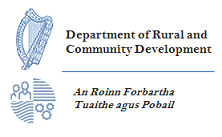Clare has become the first county to launch a rural development strategy following the Government’s Action Plan for Rural Development.
Michael Ring, T.D., Minister for Rural and Community Development, today officially launched the Clare Rural Development Strategy 2026 at a ceremony hosted by the Clare Rural Development Forum in Kilmaley Community Day-Care Centre.
The 10-year blueprint targets the creation of 4,000 jobs over the lifetime of the plan through the development of community-led social enterprises supported by Enterprise Ireland, Local Enterprise Office Clare, the Office of the Action Plan for Jobs (APJ), the LEADER Programme and the rural and community support unit of Clare County Council.
Digital hubs will be established at numerous locations throughout the county to support rural enterprise by facilitating e-working, small-scale training and conferencing.
The Strategy also targets the development of community-run Multi-Service Centres which will aim to provide a range of public services such as GP, postal, social protection, health, transport, advice and information from a single building. Innovative rural transport initiatives such as a type of ‘Rural Uber’, community car pooling and community bus services are also earmarked under the Strategy, while Clare County Council will be establishing Rural Community Development Officers in each of Clare’s four Municipal Districts in late 2017.
Speaking at today’s official launch of the Clare Rural Development Strategy, Michael Ring, T.D., Minister for Rural and Community Development, said, “Rural Ireland is changing and it is really encouraging to see that the members of the Clare Rural Development Forum are responding to these changes with a rural strategy which addresses rural challenges in a creative and practical way. With its focus on rural job creation, improved transport linkages, access to broadband and joint services this strategy complements the Government’s Action Plan for Rural Development. It is my priority to ensure that Government Departments, local authorities and community networks follow the same strategic path in relation to rural development. The Clare Rural Development Strategy is an example of this approach in action.”
“I’m really impressed by the overall strategy and in particular by some of the measures contained within it. These include the proposed development of a ‘rural Uber’ type app to facilitate car pooling and community bus services; the creation of five local digital hubs over the next 18 months to enable people to work and carry out business using high speed broadband from their local town; and the development of community-run Multi Service Centres which will provide a range of services such as GP, postal, social protection, health transport, advice and information from a single building,” added the Minister.
Councillor Tom McNamara, Mayor of Clare, commented, “The Clare Rural Development Strategy is the result of communities and organisations with an interest in the future development of the county coming together. Through the Clare Rural Development Forum, we have devised a blueprint for the rejuvenation of rural communities across Clare over the next decade.”
“I believe that this strategy will give the impetus to rural communities to show leadership and to take ownership of their own future, while at the same time avail of existing supports and expertise,” added the Mayor.
Pat Dowling, Chairperson of the Clare Rural Development Forum and Chief Executive of Clare County Council, said, “The members of Forum are honoured to be in a position to become the first county to devise and commence implementation of a Rural Development Strategy that is very much in keeping with National Government policy in this area.”
Mr. Dowling said the Clare Rural Development Strategy targets a reversal of the statistical trends that emphasise the stark challenges facing rural Clare.
“While the overall population of County Clare grew over the past thirty years, particularly rural areas suffered population declines of up to 35%. Depopulated areas lost much of their agricultural and retail employment and gained few jobs in the emerging sectors. Primary school and GP service closures and threats of closure have followed as public services contracted, he explained.
Mr. Dowling noted that there is “no broad-brush approach to countering these challenges” and that addressing them has required members of our Forum to adopt “a brave new approach, a spirit of partnership and an avoidance of negative thinking.”
“Our strategy aims to deliver jobs, multi-service centres, co-operating towns and parishes, environmental programmes, age-friendly communities, vibrant rural ways of life, and a range of infrastructure,” he stated.
The Clare Rural Development Strategy is available from the offices of Clare County Council at Áras Contae an Chláir, New Road, Ennis, Co. Clare, or may be downloaded from www.clarecoco.ie.
For further information, contact the Rural Development Directorate of Clare County Council at ruraldev@clarecoco.ie or 065 6846200.
The membership of the Clare Rural Development Forum comprises the Department of Arts, Heritage, Regional, Rural & Gaeltacht Affairs; Clare County Council; Ennis Chamber; Clare IFA; ICMSA; TEAGASC; Clare Public Participation Network (PPN); Clare Youth Service; Clare Local Development Company (CLDC); An Garda Síochána; Western Development Commission; OPW; HSE; TÚSLA; Department of Social Protection; Limerick Clare Education Training Bord (LCETB); University of Limerick (UL); LIT; GMIT; Southern Regional Assembly; Clare Accessible Transport; Rural Resettlement Ireland; Older People’s Council; Clare Family Resource Centre; Muintir na Tíre; Loop Head Tourism; Clare GAA; Clare Local Community Development Committee (LCDC); Action Plan for Jobs Mid-West; and Clare Digital Strategy.












